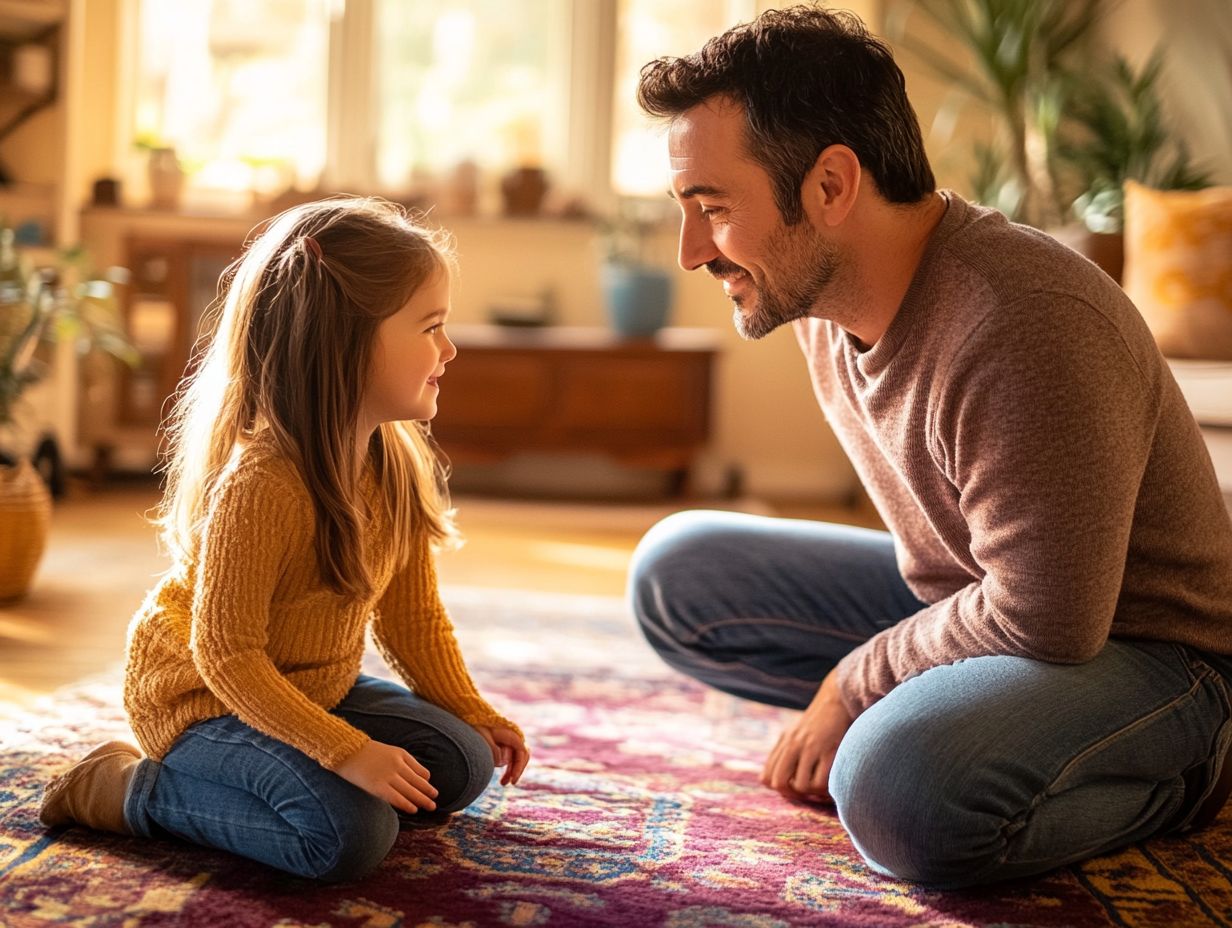The Importance of Active Listening in Parenting
Active listening is an essential skill in parenting that transcends the simple act of hearing words. It involves genuinely understanding and connecting with your child, forming meaningful connections.
This guide delves into the importance of active listening and how it cultivates stronger relationships, encourages open communication, and fosters empathy, which are critical pieces of parenting skills.
It offers practical tips for implementing active listening in your home, points out common pitfalls to steer clear of, and shares insights on how mastering this skill can revolutionize your interactions with your children, ultimately strengthening your bond.
Are you ready to strengthen your parenting skills and deepen your family connections?
Contents
- Key Takeaways:
- What is Active Listening?
- Why is Active Listening Important in Parenting?
- Benefits of Active Listening
- 2. Helps Children Feel Understood
- 3. Encourages Open Communication
- 4. Teaches Empathy
- 5. Improves Problem-Solving Skills
- How to Practice Active Listening in Parenting?
- 1. Give Your Full Attention
- 2. Use Non-Verbal Cues
- 3. Reflect and Validate Your Child’s Feelings
- 4. Ask Open-Ended Questions
- 5. Avoid Interrupting or Judging
- Common Mistakes to Avoid in Active Listening
- Frequently Asked Questions
- Frequently Asked Questions
- Active Listening in Parenting
- Why is active listening important in parenting?
- How can active listening benefit my child s emotional development?
- What are some tips for practicing active listening and compassionate parenting?
- Can active listening help in disciplining and understanding my child?
- How can I teach my child to become a better listener through attentive and compassionate parenting?
Key Takeaways:

- Active listening in parenting helps build stronger relationships with your child, ensuring they feel genuinely heard.
- It allows children to feel understood and encourages open communication, which is crucial for healthy communication.
- Active listening teaches empathy and improves problem-solving skills, supporting their social development and emotional growth.
What is Active Listening?
Active listening is an essential communication skill that requires you to fully engage with the speaker. This paves the way for meaningful connections and deeper understanding. It calls for patience, a non-judgmental mindset, and a sincere interest in the speaker s thoughts and feelings, ensuring they feel both validated and heard, which are key aspects of attentive parenting.
Active listening goes beyond merely hearing words; it encompasses recognizing body language and facial expressions, reflecting back what has been said, and fostering a safe environment for open dialogue. Embracing this practice is crucial for building trust and strengthening the bond between parents and children, ultimately promoting healthy communication and emotional growth. Effective use of listening techniques ensures that the child’s feelings are properly acknowledged.
Why is Active Listening Important in Parenting?
Active listening is an invaluable tool in effective parenting, profoundly influencing a child’s emotional development and social growth. When you engage with your child actively, you cultivate a supportive bond that nurtures self-esteem.
This approach establishes a safe environment for open communication, enhancing their verbal communication skills. It allows your child to feel genuinely understood and valued, reinforcing their trust in you.
The practice of active listening helps you grasp your child’s feelings and perspectives more clearly, paving the way for more meaningful conversations and deeper connections. This understanding perspective is essential for developing emotional intelligence.
1. Builds Stronger Relationships
Active listening is your gateway to building stronger relationships with your children. It allows you to connect on a deeper level and foster a trusting environment that encourages open dialogue. This technique involves being fully present during conversations, employing attentive listening skills that ensure your children feel genuinely heard and valued.
By embracing active listening, you can enhance your family connection and nurture a supportive bond that lasts a lifetime, promoting key aspects of compassionate parenting.
Empathetic listening involves acknowledging not just the words spoken but also the emotions behind them, helping your children feel validated in their experiences. Reflective listening takes it a step further; by paraphrasing what your child has expressed, you clarify their feelings and thoughts, signaling that you are genuinely engaged in the conversation and practicing effective listening techniques.
If your child shares frustrations about a friend’s behavior, responding with, “It seems like that really upset you,” opens the door for meaningful conversation. The impact of these nurturing connections is profound children who feel understood and supported tend to exhibit higher self-esteem and emotional resilience, enabling them to thrive in social interactions. It’s through these nurturing connections that children learn to navigate conversations effectively.
Benefits of Active Listening
2. Helps Children Feel Understood
One of the primary benefits of active listening is that it helps your child understand their emotions. When you take the time to truly listen and acknowledge your child’s feelings, you nurture a sense of emotional intelligence that s crucial for their healthy development. By validating their feelings and demonstrating understanding, you enable your children to express themselves more freely. This practice is vital for their emotional development.
This practice creates a safe space for your kids to share their thoughts without fear of judgment. For instance, when your child expresses frustration after losing a game, instead of dismissing those feelings as trivial, you might reflect back with, “It sounds like you re really upset about that loss, and that s perfectly okay.” This kind of emotional labeling not only helps your child recognize and articulate their feelings but also teaches them that it s normal to experience a range of emotions. These compassionate parenting practices are crucial for development.
As your children learn to navigate these feelings with your supportive presence, they develop healthier coping mechanisms, leading to better emotional regulation and stronger relationships with others. Your attentive response makes your child feel truly supported!
3. Encourages Open Communication
Active listening is a powerful tool that encourages open communication between you and your children, paving the way for honest discussions about feelings, experiences, and concerns. By creating an environment where your children feel safe to express themselves, you can adopt a non-judgmental attitude and engage in daily debriefs that facilitate deeper conversations. This practice elevates the quality of your communication and strengthens the bond you share with your children, bridging the gap between their childhood experiences and your parenting advice.
Establishing a safe space for your children is essential, as it enables them to voice their thoughts without the fear of criticism or dismissal. Techniques like asking open-ended questions invite your children to share more about their day or feelings, fostering dialogue that helps you understand their perspective and encourages conversation.
Your attentive responses signal to your children that their feelings are valued, encouraging ongoing conversations. This nurturing approach builds trust and significantly enhances family relationships, leading to stronger emotional connections and healthier interactions as your children grow. Such attentive listening is key to effective communication.
4. Teaches Empathy
Active listening serves as an invaluable tool for teaching empathy in children, showing how to connect with the feelings and perspectives of others. By embracing compassionate parenting practices that prioritize emotional intelligence, you can model empathetic listening, guiding your children to develop the ability to understand and respond to others’ emotions. This skill is essential for building lasting connections and strengthening family bonds.
When you actively engage in listening, you set a powerful example for your children, instilling in them the value of communication and emotional awareness in their relationships. As they observe you acknowledging feelings and demonstrating genuine interest, they naturally begin to mirror this behavior with their peers and family members. This practice enhances their relationships with others and fosters a deep sense of belonging and trust. Such attentive parenting builds a strong foundation for their future relationships.
Ultimately, cultivating empathy through active listening plays a pivotal role in social development, equipping your children with the essential tools to navigate complex emotions and build healthy, supportive relationships throughout their lives. This reflects the importance of listening in overall personality development.
5. Improves Problem-Solving Skills

Practicing active listening can significantly enhance your child’s problem-solving abilities by fostering constructive dialogue between you and your child. By engaging in attentive responses and encouraging your child to express themselves, you can help them navigate challenges while developing critical thinking skills.
This process not only strengthens your relationship but also equips your child with essential tools for addressing problems effectively. Such constructive dialogue is a critical piece of effective parenting.
For instance, when your child encounters difficulties in social interactions at school, active listening enables you to fully grasp their perspectives and emotions. Instead of jumping to conclusions or offering immediate solutions, you create an environment where your child feels safe to articulate their thoughts.
This approach helps in understanding your child’s thoughts more clearly. This respectful exchange nurtures critical thinking and promotes collaborative problem-solving.
By asking guiding questions that stimulate deeper reflection, you encourage your child to consider various viewpoints and potential solutions, reinforcing the crucial role of effective communication in resolving conflicts and making informed decisions. It encourages expression in a constructive manner.
How to Practice Active Listening in Parenting?
Engaging in active listening as a parent demands intentional effort and the strategic use of various listening techniques that cultivate deeper connections with your children. Active listening means paying full attention to what someone is saying and showing that you understand.
By dedicating your full attention, employing open-ended questions, and responding attentively, you create an environment where your children feel genuinely heard and valued.
Navigating conversations with these tools ensures that your child’s experiences are appreciated. This approach fortifies the bond between you and your child while fostering healthy communication and promoting their emotional growth.
These techniques are game-changers for your child’s growth!
1. Give Your Full Attention
Giving your full attention during conversations is essential for active listening and elevates your compassionate parenting journey. When you prioritize your child s voice by setting aside distractions, you send a powerful message that their feelings and thoughts are truly valued.
This creates a nurturing environment that supports emotional development. Such focused engagement is key to fostering a trusting relationship and deepening connections.
To put this into practice, consider designating specific times for undistracted interactions think family dinners or bedtime chats where devices are set aside and interruptions are kept at bay.
For instance, when your child excitedly shares a story about their day, maintaining eye contact and responding with thoughtful questions showcases your genuine engagement. These moments not only strengthen the parent-child bond but also allow your child to feel truly heard and understood.
Ultimately, this enhances their emotional intelligence and fosters meaningful connections. By embracing these practices, you reinforce the notion that their opinions matter, cultivating a healthy environment where emotional expression is not just welcomed but celebrated.
This creates a safe space for open communication and nurtures trusting relationships within the family.
Start practicing these strategies today to unlock a deeper connection with your child!
In conclusion, active listening is a powerful tool in parenting. It not only aids in developing essential problem-solving skills but also fosters emotional growth and connection. Implement these techniques to strengthen your relationship with your child and create a supportive environment.
2. Use Non-Verbal Cues
Non-verbal cues are essential in your journey of active listening, conveying understanding and empathy without uttering a single word. By maintaining eye contact, employing affirming gestures, and showcasing attentive body language, you can elevate your communication and exemplify emotional intelligence. These non-verbal signals reinforce the notion that your child’s feelings matter and help cultivate a safe environment for open communication.
For instance, when you lean slightly forward while your child is speaking, it demonstrates genuine interest and encourages them to share more freely. Nodding in agreement or using subtle facial expressions can affirm their feelings and validate their experiences, emphasizing your full engagement in the conversation. Additionally, mirroring your child s non-verbal expressions can deepen your connection and express empathy, making them feel truly understood.
These subtle yet powerful cues are vital in your quest to strengthen the emotional bond with your children, ultimately fostering effective communication and enhancing their emotional well-being. Practicing these techniques helps children develop social and emotional development skills.
3. Reflect and Validate Your Child’s Feelings
Reflective listening is an art that involves paraphrasing and validating your child’s feelings, ensuring they feel understood and respected. By acknowledging their emotions through reflective responses, you can emphasize the importance of emotional labeling, helping your child develop a nuanced understanding of their feelings. This practice not only promotes open communication but also fortifies the bond between you and your child, enhancing their self-esteem.
For instance, if your child voices frustration over an unfinished homework assignment, you might respond by saying, “It sounds like you’re feeling really overwhelmed right now with your schoolwork. That’s understandable; many kids feel this way too.” This response not only mirrors your child’s feelings but also validates their experience, reassuring them that feeling overwhelmed is perfectly normal.
When you consistently practice reflective listening, you cultivate an environment where your child feels safe to express their emotions, paving the way for healthy emotional development. Such nurturing connections can lead to increased confidence and foster open dialogue about feelings, both of which are essential for your child’s overall well-being. This form of attentive parenting helps in building a supportive bond.
4. Ask Open-Ended Questions
Asking open-ended questions is a powerful strategy in active listening, encouraging children to express themselves and delve deeper into their thoughts and feelings. By inviting such dialogue, you can facilitate meaningful conversations that enhance emotional development and strengthen your family connections. This practice not only reflects a genuine interest in your child’s perspective but also nurtures critical thinking skills, thus promoting social development.
For instance, consider asking questions like, “What was the best part of your day today?” or “How do you feel about what happened at school?” These inquiries allow children to elaborate on their experiences and opinions without the confines of yes or no answers. Such questions help in building verbal communication skills and encourage a deeper conversation.
This approach significantly boosts children’s expressive communication skills, fostering a habit of articulating their feelings and ideas. By creating this open atmosphere, you cultivate trust and deeper connections in your parent-child relationship, leading to a more supportive and communicative family environment.
5. Avoid Interrupting or Judging
One of the core principles of active listening is refraining from interrupting or judging your child while they express themselves. This non-judgmental attitude conveys respect for their thoughts and feelings.
Creating an atmosphere of trust and open communication is essential for building strong relationships and fostering emotional intelligence. It encourages children to express themselves freely.
When children sense that their stories are valued and their expressions are welcomed without interruption, they become more inclined to share their innermost thoughts. By cultivating this supportive environment, you not only bolster their confidence but also contribute to their emotional development, allowing them to articulate their feelings and thoughts with greater clarity. This approach fosters a trusting relationship within the family.
Through the validation of their experiences via active listening, you help instill a sense of self-worth and resilience. Encouraging your children to express themselves in a safe space enhances their vocabulary and communication skills, paving the way for healthier interpersonal relationships in the future. This is a critical piece of empathetic listening and compassionate parenting.
Common Mistakes to Avoid in Active Listening

Practicing active listening is vital for effective communication, but there are common mistakes that you should steer clear of to ensure your efforts lead to positive outcomes. These pitfalls can obstruct the listening process and strain the parent-child relationship, making it essential to be mindful of them. By identifying these missteps, you can enhance your active listening skills and cultivate a more supportive and understanding environment for your child. This involves attentive listening and understanding their perspective.
1. Not Listening or Paying Attention
One of the most significant mistakes you can make in active listening is not truly tuning in to what a child is saying. This often occurs when distractions creep in or when you’re lost in your own thoughts, causing you to miss vital moments for connection and understanding. Such lapses can undermine your emotional intelligence and the effectiveness of your communication.
Practicing attentive parenting helps in focusing on healthy communication. In today s fast-paced world, where notifications and multitasking reign supreme, it s essential to acknowledge the profound impact that distractions can have on your listening process. These interruptions not only fragment your attention but also detract from the quality of your interactions with young ones.
To cultivate better connections, you must create an environment that fosters focused conversations. Consider implementing strategies such as:
- Setting aside designated device-free times
- Maintaining eye contact
- Using reflective responses to show you understand
By prioritizing a fully present mindset, you can significantly enhance your active listening skills, ensuring that children feel heard, valued, and understood. This leads to constructive dialogue and deeper conversations.
Start implementing these active listening techniques today and watch your relationship with your child flourish!
2. Offering Unsolicited Advice
Offering unsolicited advice can be a roadblock to your goals of active listening, as it may leave children feeling unheard or dismissed. Instead of validating their feelings and encouraging open expression, such advice often leads to frustration and a breakdown in communication. This misstep can hinder emotional development and weaken the parent-child bond. Practicing empathetic listening and understanding your child’s thoughts are crucial parenting skills.
When you rush to give solutions, you inadvertently convey that your child’s thoughts and emotions aren t worthy of exploration. This reaction can discourage them from sharing their feelings in the future, creating a barrier that stunts their emotional growth. Children may learn to suppress their thoughts, fearing they won t be understood or allowed to fully express themselves. This affects their emotional intelligence and developmental skills.
By prioritizing genuine listening over the urge to fix, you can cultivate a safe environment where children feel valued. This supportive atmosphere enhances trust and nurtures open dialogue, both of which are essential for healthy emotional maturation. Such practices improve problem-solving skills and help children to express themselves clearly.
3. Being Distracted or Preoccupied
Being distracted or preoccupied during conversations can significantly undermine your ability to practice active listening. When you fail to give your full attention, it conveys to your child that their thoughts and feelings do not hold importance, which can erode trust and hinder the development of emotional intelligence. This distraction creates barriers to nurturing connections and healthy communication. Practicing attentive listening helps in developing a trusting relationship.
Distractions like smartphones, television, or personal worries can lead to missed opportunities for meaningful engagement. Children are acutely aware of these interruptions; they often feel dismissing or undervalued, which may cause them to withdraw and express themselves less over time.
To minimize distractions, it s essential to establish screen-free zones and designate specific times for focused interactions. By practicing attentive listening, you not only strengthen the bond with your child but also create an environment where they feel safe to articulate their emotions and experiences openly. This helps in navigating conversations effectively.
This closeness lays the groundwork for building strong, trusting relationships, ultimately enhancing their emotional well-being. Practicing such parenting techniques is crucial for healthy communication.
Frequently Asked Questions
What is active listening in parenting?
Active listening in parenting involves fully engaging with your child s thoughts and feelings. It includes maintaining eye contact, paraphrasing, and validating their emotions. This technique enhances communication, builds trust, and fosters emotional intelligence.
How can I improve my active listening skills?
To improve your active listening skills, practice being fully present during conversations, ask open-ended questions, and avoid offering unsolicited advice. This helps in creating meaningful connections and understanding your child s perspective.
Why is active listening important for children?
Active listening is crucial for children as it makes them feel valued and understood. It promotes emotional development, enhances problem-solving skills, and leads to a healthier parent-child relationship.
What are some common mistakes in active listening?
Common mistakes include being distracted, offering unsolicited advice, and interrupting your child. Avoiding these pitfalls ensures a supportive and understanding environment for your child.
Frequently Asked Questions
What is active listening in parenting?
Active listening in parenting is a communication technique where a parent focuses on truly understanding and empathizing with their child’s thoughts and feelings. It involves giving full attention, listening without judgement, and responding with empathy. This attentive listening helps in nurturing connections and strengthens the parent-child bond.
Active Listening in Parenting
Why is active listening important in parenting?
Active listening builds a strong, trusting relationship between a parent and child. It helps parents understand their child’s perspective and validate their feelings.
By actively listening, parents can improve communication and problem-solving skills. These listening skills are crucial for encouraging good conversations and creating meaningful connections.
How can active listening benefit my child s emotional development?
Active listening can benefit your child in many ways, including promoting self-esteem and fostering healthy emotional development. It improves their communication skills as well.
When children feel heard and understood, it leads to a stronger parent-child bond. Teaching children the importance of listening plays a critical role in their social development.
What are some tips for practicing active listening and compassionate parenting?
- Maintain eye contact.
- Listen without interrupting.
- Use nonverbal cues such as nodding and facial expressions.
- Paraphrase and reflect your child’s feelings.
- Ask open-ended questions to encourage further communication.
Practice patience and maintain a non-judgmental attitude to show genuine interest in your child s thoughts and feelings.
Can active listening help in disciplining and understanding my child?
Yes, active listening can help discipline your child in a positive and effective way. By understanding the root cause of your child’s behavior, you can address their underlying needs.
This form of empathetic listening allows for constructive dialogue and helps navigate conversations with your child.
How can I teach my child to become a better listener through attentive and compassionate parenting?
You can teach your child to become a better listener by setting a good example through active listening. Provide positive reinforcement for listening attentively and encourage them to express their thoughts and feelings.
Practice active listening together as a family. Create a safe space for daily debriefs and practice reflective listening to significantly improve your child s listening skills and emotional intelligence.
Transform your parenting with active listening! Start practicing these techniques today to see immediate benefits.







